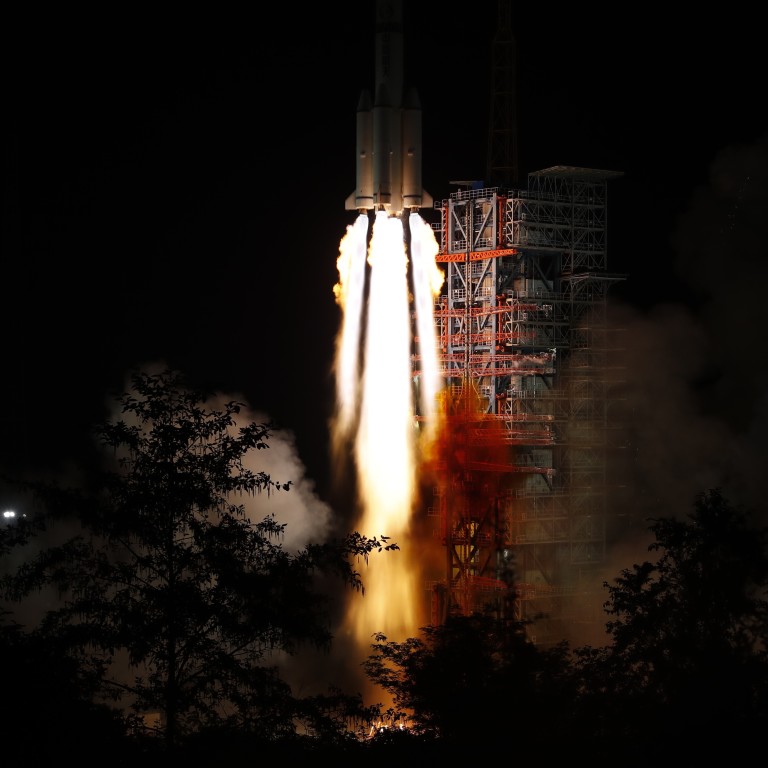
China’s BeiDou system one satellite closer to full operation
- Lift-off in country’s southwest as rivalry with GPS heats up
- Engineers say they overcame coronavirus complications to complete mission
China is now one satellite away from completing an orbiting network to rival GPS, with another successful launch in the country’s south on Monday.
The 54th and second-last of the constellation of the BeiDou navigation system was sent into a geostationary orbit by a Long March 3B carrier rocket from the Xichang Satellite Launch Centre in Sichuan province, southwest China, state news agency Xinhua reported on Tuesday.
The last of the 30 BeiDou satellites in the third-generation system is expected to be launched in May, three years after the first one went into orbit.
When completed, the network will be accurate to 10cm (3.9 inches) in China and Asia-Pacific, compared with the 30cm range offered by the US’ Global Positioning System (GPS).
BeiDou features have already been built into many popular smartphones, with processor chips such as Qualcomm’s Snapdragon and Huawei’s Kirin using the technology along with GPS and sometimes Europe’s Galileo and Russia’s Glonass systems, which allows access to as many satellite signals as possible.
Compared with its rivals, BeiDou has added services such as text messaging, enabling communications between users and the ability to trace users’ locations in emergencies.
These services helped locate victims after the devastating 2008 Sichuan earthquake.
China completes core network of GPS rival BeiDou with latest satellite launch
The central government has ordered all passenger buses, heavy trucks and fishing boats to install BeiDou terminals to ensure real-time monitoring and tracking. As of 2017, 22 million vehicles and 50,000 boats had been fitted with BeiDou systems.
Pan Yuqian, one of the designers of the BeiDou-3 satellite series, said the new launch would enable users to send text messages of more than 1,000 Chinese characters as well as transmit pictures, which could be useful in emergencies.
Researchers said the constellation would also help advance next-generation technologies, such as driverless vehicles, 5G and robotics.
The system is aimed mainly at China and Asia-Pacific, with three satellites in geostationary orbit and three in inclined geosynchronous satellite orbit enabling better coverage of the region, according to its designers. The core of the constellation comprises 24 satellites in medium earth orbit.
“[The system] could effectively increase satellite visibility in Asia-Pacific and enable a better service in this region,” BeiDou chief designer Yang Changfeng said.
China has promoted BeiDou to commercial users in the region, and in particular to countries taking part in the Belt and Road Initiative.
BeiDou, China’s answer to GPS, ‘six months ahead of schedule’ after latest satellite launch
China launched the BeiDou project in the 1990s when the Chinese military needed a satellite navigation system of its own to replace GPS, which is owned by the US government and run by the US Air Force.
The need was highlighted in the mid-1990s when some of the Chinese military’s cruise missiles missed their targets during drills meant to send a signal to Taiwan.
Beijing has since invested heavily in BeiDou to ensure independent and reliable satellite navigation for its missiles and guided bombs.
The first BeiDou satellites were launched in 2000, and eventually evolved into the present third-generation of the system while expanding into commercial use.
Purchase the China AI Report 2020 brought to you by SCMP Research and enjoy a 20% discount (original price US$400). This 60-page all new intelligence report gives you first-hand insights and analysis into the latest industry developments and intelligence about China AI. Get exclusive access to our webinars for continuous learning, and interact with China AI executives in live Q&A. Offer valid until 31 March 2020.

